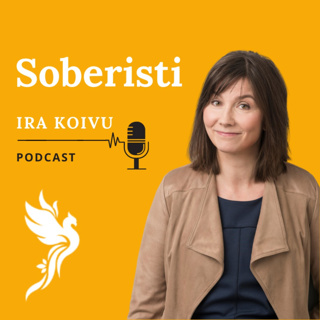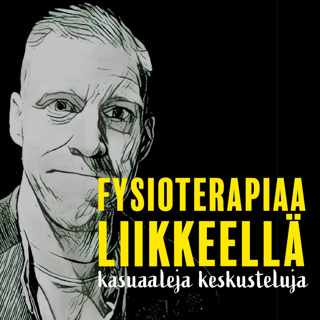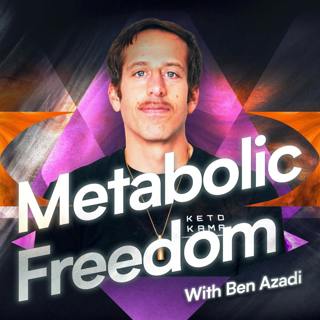
#1079 The Truth About Cheese: What to Avoid and What to Eat for Fat Loss, Energy, and a Healthier Gut With Ben Azadi
Ben breaks down the cheeses that can sabotage your metabolism and the ones that can boost fat burning, lower inflammation, and support gut health. You’ll discover why 75% of people react poorly to certain dairy proteins and lactose, the dangers of processed and low-fat cheeses, and the nutrient-rich, A2 casein cheeses that have been enjoyed for centuries without harm. Highlights: 7 cheeses to avoid: American, ricotta, low-fat/flavored cottage cheese, cream cheese, cow-based mozzarella, brie, and blue cheese. 5 best options: Goat cheese, sheep cheese, aged Parmesan, goat’s milk feta, and organic grass-fed ghee. Why vegan cheese alternatives often harm gut health. The benefits of raw, grass-fed, unpasteurized dairy. How dairy can impact skin health, weight loss, and inflammation. Resources & Links: Free Burn Fat E-Book: https://bit.ly/3V19Gfr Ben’s events & speaking schedule: http://benazadeh.com/events 🎁 Purchase Ben's new book Metabolic Freedom: http://www.metabolicfreedombook.com 🔎 Find all of the Metabolic Freedom Sponsorship deals and coupon codes here: https://www.ketokamp.com/sponsorship-deals
12 Elo 16min
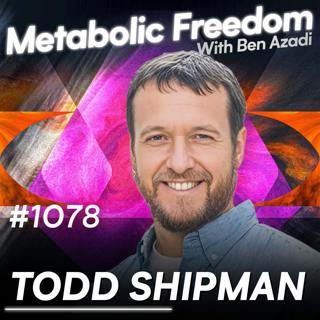
#1078 The Invisible Stress Destroying Your Metabolism – And How to Stop It Fast with Todd Shipman
On this episode, Ben Azadi sits down with quantum wellness expert Todd Shipman for a fascinating deep dive into the unseen forces affecting your health—electromagnetic fields (EMFs) and quantum energy. Todd shares his personal journey and reveals how Leela Quantum’s cutting-edge tools, like the Infinity Block and Quantum Upgrade, are designed to shield the body from EMF stress, supercharge your mitochondria, and boost heart rate variability. Think of it as creating a “protective bubble wrap” around your body—helping you feel calmer, more energized, and better equipped to thrive in today’s tech-saturated world. Backed by compelling science and real-world stories, this conversation offers practical ways to protect your health, optimize your metabolism, and live with less stress—even when you’re surrounded by screens and devices. 🔥 Topics Discussed: Impact of electromagnetic fields (EMFs) on human health and metabolism. Role of quantum energy in enhancing mitochondrial function and overall well-being. Protective effects of quantum energy against environmental stressors. Scientific studies supporting the benefits of Leela Quantum products. Mechanisms of ATP production and heart rate variability improvement. Personal experiences and skepticism surrounding quantum wellness. Discussion of innovative quantum wellness products, including EMF-blocking clothing. Techniques for measuring the effects of EMFs and quantum energy on the body. Concept of hormesis and its relation to stress management and health. Customizable quantum energy services for personal and environmental protection. 🔗 Links and Resources: Get Leela Quantum Products Follow Leela on Instagram The Hidden Messages in Water by Masaru Emoto 📍 Ben’s speaking tour & book signings → http://benazadi.com/events 👉 http://metabolicfreedombook.com 🔎 Find all of the Metabolic Freedom Sponsorship deals and coupon codes here: https://www.ketokamp.com/sponsorship-deals
11 Elo 51min

#1077 The 7-Day Belly Fat Flush That Fixes What Your Doctor Missed – Detox, Burn Fat, and Reset Your Metabolism With Ben Azadi
In this episode of The Metabolic Freedom Podcast, Ben Azadi reveals a 7-day belly fat flush that targets the real root causes of stubborn belly fat — liver overload, insulin resistance, and hidden inflammation — rather than just calorie restriction. You’ll learn daily, actionable steps including olive oil shots, high CGA coffee, apple cider vinegar, strategic walking, hydration protocols, fasting, and powerful mindset affirmations. Each day builds on the last to detoxify your body, balance hormones, activate fat-burning, and reset your metabolism. Ben also answers listener questions on repeating the protocol, adapting it for post-menopausal women, exercising during a fast, and tracking carbs vs. calories. Free Resources & Links Mentioned: Free 30-Day Belly Fat Plan: https://bit.ly/455tKmT Olive Oil: http://ketokampoliveoil.com Coffee: http://ketokampcoffee.com (Code: KETOKAMP for 15% off) Electrolytes & Salt: http://ketokampsalt.com (Code: AZADI) Protein: https://www.equipfoods.com/benazadi Urolithin A: http://timeline.com/azadi (Code: "AZADI" for 20% off) Events: http://BenAzadi.com/events Cronometer App: http://cronometer.com/Ketokamp 🔎 Find all of the Metabolic Freedom Sponsorship deals and coupon codes here: https://www.ketokamp.com/sponsorship-deals
10 Elo 21min

#1076 The Shocking Truth About ‘Healthy’ Vegetables That Are Keeping You Fat, Inflamed, and Exhausted — What to Eat Instead With Ben Azadi
In this eye-opening episode, Ben Azadi reveals 7 vegetables that may be silently fueling inflammation, joint pain, and belly fat—despite being labeled as “healthy.” Learn the truth about oxalates, lectins, and goitrogens, and discover better food swaps that support fat loss, gut health, and energy. Ben also answers your top questions about nightshades, leafy greens, and food sensitivities—and gives away a free fat loss ebook to jumpstart your results. 🎁 Grab your free guide:https://bit.ly/46EYYm5 📅 Meet Ben on tour: http://benazadi.com/events 🔎 Find all of the Metabolic Freedom Sponsorship deals and coupon codes here: https://www.ketokamp.com/sponsorship-deals
9 Elo 15min

#1075 Why Microplastics Are Making You Sick, Fat, and Tired — And The Exact Protocol to Remove Them — With Ben Azadi
Microplastics are invading your body — and they're wreaking havoc on your hormones, gut, metabolism, and fat-burning ability. In this episode, Ben Azadi reveals why these invisible toxins cause weight loss resistance and inflammation, and how to safely detox them using natural strategies. You’ll learn: Why microplastics are stored in your fat cells How they damage your cell membranes and disrupt hormones The best way to rebuild your cells using phosphatidylcholine (PC) How fasting, strength training, and heat activate your body’s internal cleanup (autophagy + mitophagy) Top foods and supplements for microplastic detox How to love your liver and support bile flow Practical tips to reduce microplastic exposure in everyday life 🎁 Download Ben’s free ebook: https://bit.ly/4ma7HS7 ☕ Shop liver-supporting coffee: http://ketokampcoffee.com/ – use code KETOKAMP for 15% off 🎤 Meet Ben on tour: http://benazadi.com/events 🔬 Learn more about Urolithin A: http://timeline.com/azadi use this link for 20% off 🧲Cellular Solutions Gut CLR: https://store.healthcenters.com/?oid=5&affid=5 🧬BodyBio PC Oil: https://bodybio.com/?ref=KETOKAMP use the code “KETOKAMP” for 15% off 🔎 Find all of the Metabolic Freedom Sponsorship deals and coupon codes here: https://www.ketokamp.com/sponsorship-deals
7 Elo 21min
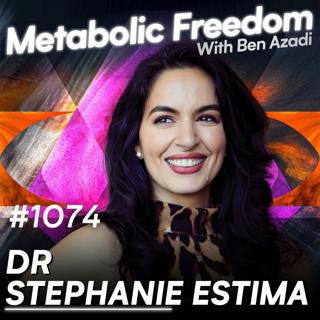
#1074 Why You’re Not Losing Fat (Even If You’re Doing Everything Right) – Game-Changing Fixes with Dr. Stephanie Estima
In this episode of Metabolic Freedom Podcast, Ben Azadi sits down with Dr. Stephanie Estima to uncover the five biggest mistakes women often make when trying to lose fat—like cutting calories for too long, not getting enough sleep, fearing carbs, overdoing cardio, and being their own worst critic. Dr. Estima shares practical, science-backed strategies to help women achieve sustainable fat loss, balance their hormones, and shift their mindset toward nourishment, rest, and self-compassion. They also dive into smart exercise tips, why creatine is a game-changer, and how gratitude can transform your health journey. This conversation is packed with actionable advice and inspiration to help you feel empowered, not restricted, on your path to true wellness. 🔥Topics Discussed: Common mistakes women make in fat loss efforts The impact of caloric restriction on metabolism and hormonal health The importance of sleep for body composition and overall health Exercise strategies, including the effectiveness of short, intermittent workouts The role of carbohydrates in women's diets and their relationship with hormonal health Mindset shifts needed for a healthier relationship with food and body image The dangers of excessive cardio for fat loss The significance of tracking non-scale victories in health journeys The influence of societal pressures on women's self-image and health choices The importance of self-compassion and gratitude in personal growth and well-being 🔗 Links and Resources: Connect with Dr. Stephanie Estima: Website Instagram Facebook BETTER! Podcast Books Mentioned: Youth Squared" by Pryce Pritchard: https://amzn.to/4omXxPy The Betty Body: A Geeky Goddess Guide to Intuitive Eating, Balancing Hormones, and Transformative Sex: https://amzn.to/3UgVgHW 👉Essential Amino Acids and Creatine : http://www.getkion.com/metabolic (20% off code automatically applied) 📍 Ben’s speaking tour & book signings → http://benazadi.com/events 👉 http://metabolicfreedombook.com 🔎 Find all of the Metabolic Freedom Sponsorship deals and coupon codes here: https://www.ketokamp.com/sponsorship-deals
6 Elo 1h 1min

#1073 The 5-Minute Dopamine Reset: How to Kill Cravings, Calm Cortisol, and Rewire Your Brain Naturally — With Ben Azadi
In this episode, Ben Azadi reveals a simple yet powerful 5-minute method to break food cravings—without willpower, extra time, or a new routine. Learn how Big Food designs snacks to hijack your brain, how to interrupt the craving loop with sensory action and gratitude (aka "Vitamin G"), and why cravings are driven by dopamine, cortisol, and gut signals. Plus, hear actionable micro habits to amplify results, real-life success stories, and answers to listener questions about sugar, alcohol, supplements, and more. Highlights: Cravings are manufactured, not a sign of weakness The 5-minute craving breaker: sensory stimulation + gratitude Why “Vitamin G” (gratitude) rewires your brain without addiction Bonus tips: 30-30 rule, apple cider vinegar, nasal breathing, L-glutamine Real results: Sarah’s story of beating night binges and losing 8 lbs Cravings only last 3–5 minutes—master this and win for life Resources Mentioned:📘 Free eBook: https://bit.ly/4mxGjgR 🎤 Live events & book tour: http://benazadi.com/events L-Glutamine: https://amzn.to/4olyhZW 🔎 Find all of the Metabolic Freedom Sponsorship deals and coupon codes here: https://www.ketokamp.com/sponsorship-deals
5 Elo 15min
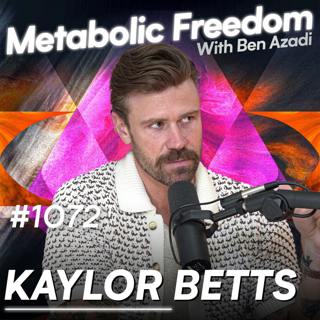
#1072 Living on Autopilot? – The Best Morning Routine to Rewire Your Brain & Boost Mental Clarity with Kaylor Betts
In this powerful episode of the Metabolic Freedom Podcast, Ben Azadi sits down with Kaylor Betts for a raw and inspiring conversation about mental health, healing, and living with purpose. Kaylor opens up about his journey through anxiety and addiction—and how he turned things around by getting intentional about his habits, mindset, and mission. They dive into what it really takes to break free from self-sabotage, including simple but life-changing tools like morning light, mindful movement, and setting boundaries with technology. Kaylor shares why fulfillment and purpose are non-negotiable for long-term mental and metabolic health, and how small, consistent shifts can rewire your subconscious for lasting change. If you're ready to stop living on autopilot and start creating a life that actually feels good—mentally, physically, and spiritually—this episode is for you. 🔥 Topics DIscussed: Importance of conscious awakening and intentional living for overcoming mental health challenges. The concept of "waking up twice" to break self-sabotaging patterns. The role of the subconscious mind in behavior and habit formation. Strategies for building mental resilience and emotional regulation. The significance of morning routines, including exposure to natural light. The impact of environment and relationships on mental health and subconscious programming. The necessity of persistence and taking action to build confidence and discipline. The relationship between purpose, fulfillment, and making healthier lifestyle choices. The gradual process of reprogramming the subconscious through repetition and emotional impact. The importance of aligning with one's purpose to enhance overall well-being and resilience. 🔗 Links and Resources: Connect with Kaylor Betts: https://awakeandwinning.com/ Instagram TikTok YouTube Facebook 📍 View Ben’s keynote tour schedule: http://benazadi.com/events 👉 http://metabolicfreedombook.com 🔎 Find all of the Metabolic Freedom Sponsorship deals and coupon codes here: https://www.ketokamp.com/sponsorship-deals
4 Elo 1h 1min


















